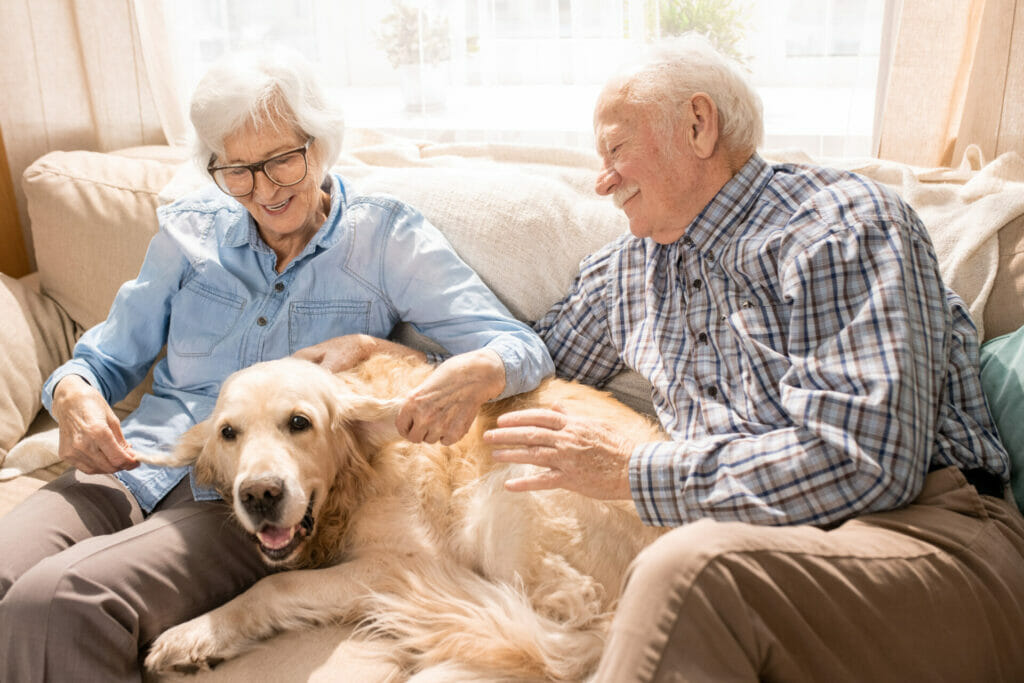Dogs aren’t just for young people! You’re never too old to appreciate the love and companionship that only dogs can give us. Senior citizens can have social, emotional, and physical health benefits from having access to dogs or sharing their home with a dog. Dogs are great companions, and senior citizens can experience tangible benefits from spending more time with dogs.
Exercise:
One of the critical benefits for dog owners of all ages is how our dogs, both big and small, inspire people to be more physically active. All of us can benefit from walking more, and dogs are a great excuse to get ourselves up and walking. This increase in activity can support senior citizens with being more active and improve their quality of life. This increase in activity can help maintain overall physical health and increase mobility and fitness levels.
Decreasing Isolation:
Isolation and loneliness are significant issues facing people as they age. Senior citizens may feel left behind by busy younger family members or be geographically isolated from friends and family. Studies have found that senior citizens who feel lonely are at increased risk for various mental and physical health outcomes. The study found that seniors with pets were 36% less likely to report loneliness. Having pets could help seniors to live happier and less emotionally isolated lives. Dogs can be an excellent source of companionship for seniors, giving them someone to talk with and connect to. Dogs can also encourage senior citizens to be more outgoing and active in their local communities. Walking the dog is a great way to meet other people, and so dog scans help seniors to be less isolated and to make friends.

Heart Health
Dogs are wonderful companions, and they not only make us happier, and they can even make us healthier! Owning a dog has been shown to lead to a decreased risk of cardiovascular disease. Sharing your life with a dog, petting dogs, and being around dogs can also help to lower blood pressure. This can have positive health outcomes, which can help improve your health at any age. Having a dog can’t and shouldn’t replace aspects of a heart-healthy lifestyle and regular medical care, but these health benefits can be great for senior citizens.
Finding The Right Dog:
Don’t just get a dog for your elderly relative and assume they will immediately bond with the dog and see positive health impacts. Ensure you or your family member are prepared for all the realities of owning a dog. Then, it’s essential to make sure the dog you select will be an appropriate temperament, energy, size, and behavioral match. For example, the demands of raising and training a puppy might not be a good fit for some seniors who are less active than they used to be. Similarly, a rambunctious large dog could be a poor match for a senior who isn’t steady on their feet. When looking for the correct dog, ensure you are honest with yourself about what you can take on physically and emotionally. Senior citizens should try to make plans with friends, family, or other dog professionals about who will care for the dog if their health declines or are no longer able to live independently.
Access To Dogs:
Senior citizens living in assisted living facilities generally cannot have dogs. Even though, at this stage in life, they won’t be able to have their dogs; these seniors can still benefit from access to dogs. Therapy dogs are specially trained dogs who, alongside their owners/handlers, visit people in various settings, including hospitals and nursing homes. These dogs have an extremely calm temperament and gently engage with medically fragile people. Studies have shown that therapy dogs can be especially beneficial for seniors with dementia and Alzheimer’s. Therapy dogs can be a beneficial intervention for seniors to increase cognitive function and decrease depression and other dementia-related symptoms, improving someone’s overall quality of life.
For senior citizens looking for companionship, dogs can be a great source of comfort. Dogs can help people of all ages to live healthier and more active lives. Dogs can naturally encourage seniors to get up in the morning, keep a routine, and get out of the house more. Dogs can also help to decrease feelings of isolation and support senior citizens to live more enriched lives.




















